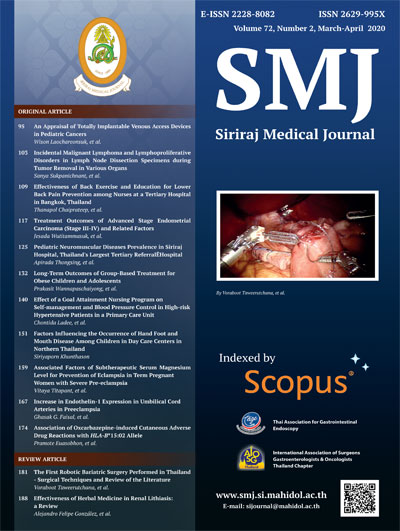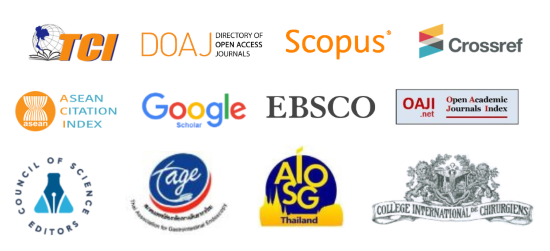Effect of a Goal Attainment Nursing Program on Self-management and Blood Pressure Control in High-risk Hypertensive Patients in a Primary Care Unit
DOI:
https://doi.org/10.33192/Smj.2020.19Keywords:
Self-management; hypertension; cardiovascular disease; goal attainment; behavior modificationAbstract
Objective: To determine the effects of goal attainment in nursing programs among hypertensive patients who are at high-risk to cardiovascular disease.
Methods: A quasi-experimental study was conducted in a primary care unit setting. Eligible participants included hypertensive patients aged 35 years and above with poorly controlled blood pressure and accompanying risk factors for cardiovascular disease. Seventy-eight participants were divided evenly into two groups via simple random sampling. The experimental group participated in a 10-week program consisting of small group education/demonstration sessions focused on goal setting and self-management behavior. These participants also received a follow-up phone call and text messages that served as reminders/reinforcements. The control group received routine care only, which included appropriately consultation with health care providers.
Results: The proportion of participants who achieved optimal blood pressure control (SBP < 140 mmHg) in the experimental group (80.6%) was greater than the control group (44.1%) (p-value < 0.05). In addition, the systolic blood pressure of the experimental group ( 131.33 mmHg, S.D. 12.09) was significantly lower than that of the control group ( 142.96 mmHg, S.D. 15.77) (p-value < 0.05). The mean scores for self-management behavior were significantly higher in the experimental group ( 106.14, S.D. 14.43) than the control group ( 83.21, S.D. 8.17) (p-value < 0.05).
Conclusion: The goal attainment nursing program targeting behavior modification through empowerment was effective in improving self-management behavior among hypertensive patients at high risk for cardiovascular disease. Thus, this program can be applied to patients with uncontrolled chronic diseases.
References
2. Whelton PK, Carey RM, Aronow WS, Casey DE, Jr., Collins KJ, Dennison Himmelfarb C, et al. 2017 ACC/AHA/AAPA/ABC/ACPM/AGS/APhA/ASH/ASPC/NMA/PCNA Guideline for the Prevention, Detection, Evaluation, and Management of High Blood Pressure in Adults: A Report of the American College of Cardiology/American Heart Association Task Force on Clinical Practice Guidelines. Hypertension 2018;71(6):e13-e115.
3. Tajeu GS, Booth JN, 3rd, Colantonio LD, Gottesman RF, Howard G, Lackland DT, et al. Incident Cardiovascular Disease Among Adults with Blood Pressure <140/90 mm Hg. Circulation 2017;136:798-812.
4. Nakkling Y, Rawiworrakul T, Tachaboonsearmsak P, Satheannoppakao W. Effect of self-efficacy theory application on diet control, exercise behaviors and blood pressure among older adults with hypertension. Journal of Boromarajonani College of Nursing 2012;28:1-12.
5. Udompittayarat K. Health Education Program Applying Self-Efficacy Theory to Promote Exercise Behavior in Essential Hypertensive Patients. Veridian E-Journal, Silpakorn University (Humanities, Social Sciences and arts). 2014;7:62-72.
6. Kitaoka K, Nagaoka J, Matsuoka T, Shigemura C, Harada K, Aoi W, et al. Dietary intervention with cooking instructions and self-monitoring of the diet in free-living hypertensive men. Clin Exp Hypertens 2013;35:120-7.
7. Kim J, Han HR, Song H, Lee J, Kim KB, Kim MT. Compliance with home blood pressure monitoring among middle-aged Korean Americans with hypertension. J Clin Hypertens (Greenwich) 2010;12:253-60.
8. McManus RJ, Mant J, Haque MS, Bray EP, Bryan S, Greenfield SM, et al. Effect of self-monitoring and medication self-titration on systolic blood pressure in hypertensive patients at high risk of cardiovascular disease: the TASMIN-SR randomized clinical trial. JAMA 2014;312:799-808.
9. Bureau of non-communicable diseases, Department of diseases control, MOPH, Thailand. Guidelines for assessment cardiovascular risk. 1st ed. Bangkok: WVO Office of Printing Mill; 2014.
10. Harris MF, Fanaian M, Jayasinghe UW, Passey ME, McKenzie SH, Powell Davies G, et al. A cluster randomised controlled trial of vascular risk factor management in general practice. Med J Aust 2012;197:387-93.
11. Park YH, Chang H, Kim J, Kwak JS. Patient-tailored self-management intervention for older adults with hypertension in a nursing home. J Clin Nurs 2013;22:710-22.
12. Bureau of non-communicable diseases, Department of diseases control, MOPH, Thailand. A practical guide for health behavioral modification to reduce multiple risk factors on cardiovascular disease. 1st ed. Bangkok: National Buddhism Printing Office; 2010.
13. Kawthaisong C, Dungsong R. Effects of behavioral development program for stroke prevention among hypertensive patients in Chumpuang Hospital (Chumpuang district, Nakhon Ratchasima province). Srinagarind Med J 2014;29:295-303.
14. Cohen J. Statistical power analysis for the behavioral sciences. 2nd ed. Hillsdale, New Jersey: Lawrence Erlbaum Associates; 1988.
15. Faul F, Erdfelder E, Lang AG, Buchner A. G*Power 3: a flexible statistical power analysis program for the social, behavioral, and biomedical sciences. Behav Res Methods 2007;39:175-91.
16. Chaikul C. Effects of self-management and family participation enhancing program on health behavior and blood pressure among elderly with hypertension [the degree of Master of Nursing Science (adult nursing)]. Prince of Songkla University; 2014.
17. Akhter N. Self-management among patients with hypertension in Bangladesh [the degree of Master of Nursing Science]. Prince of Songkla University; 2010.
18. Morisky DE, Ang A, Krousel-Wood M, Ward HJ. Predictive validity of a medication adherence measure in an outpatient setting. J Clin Hypertens (Greenwich) 2008;10:348-54.
19. Plaiyod J, Panpakdee O, Taikerd C. Effects of a Promoting Self-Care Participation Program on Perceived Self-Care Ability, Body Weight, and Blood Pressure Control in Persons with Hypertension. Ramathibodi Nursing Journal 2012;18:223-36.
20. Wongsuwan P, Thiangtham W, Paowatana A, Nanthamongkolchai S. Health promotion program for complications preventing among older persons with hypertension in Bangkok metropolitan. Journal of Public Health Nursing 2014;28:145-60.
21. Thanumoh J, Oba N, Tansupasawasdikun S. Effects of Goal Attainment Program on Alcohol Consumption Behaviors and Blood Pressure Level in Hypertensive Patients. Journal of Nursing and Health Sciences 2016;10:96-107.
22. Phangsuput A, Namjuntra R. Effects of a Transaction Program on the Health Behaviors and Blood Pressure Levels of Patients with Hypertension. Thai Red Cross Nursing Journal 2016;9:75-91.
23. Yi SS, Tabaei BP, Angell SY, Rapin A, Buck MD, Pagano WG, et al. Self-blood pressure monitoring in an urban, ethnically diverse population: a randomized clinical trial utilizing the electronic health record. Circ Cardiovasc Qual Outcomes 2015;8:138-45.
24. Spirk D, Noll S, Burnier M, Rimoldi S, Noll G, Sudano I. Effect of Home Blood Pressure Monitoring on Patient’s Awareness and Goal Attainment Under Antihypertensive Therapy: The Factors Influencing Results in Anti-HypertenSive Treatment (FIRST) Study. Kidney Blood Press Res 2018;43:979-986.
25. Go AS, Bauman MA, Coleman King SM, Fonarow GC, Lawrence W, Williams KA, et al. An Effective Approach to High Blood Pressure Control: a science advisory from the American Heart Association, the American College of Cardiology, and the Centers for Disease Control and Prevention. J Am Coll Cardiol 2014;63:1230-8.
Downloads
Published
How to Cite
Issue
Section
License
Users are free to share, copy, and redistribute all articles published in the Siriraj Medical Journal (SMJ) in any medium or format as long as you follow the following terms:
- Attribution — You must give appropriate credit, provide a link to the material, and indicate if changes were made. You may do so in any reasonable manner, but not in any way that suggests the publisher endorses you or your use.
- NonCommercial — You may not use the material for commercial purposes.
- NoDerivatives — If you remix, transform, or build upon the material, you may not distribute the modified material.
- No additional restrictions — You may not apply legal terms or technological measures that legally restrict others from doing anything the license permits.











